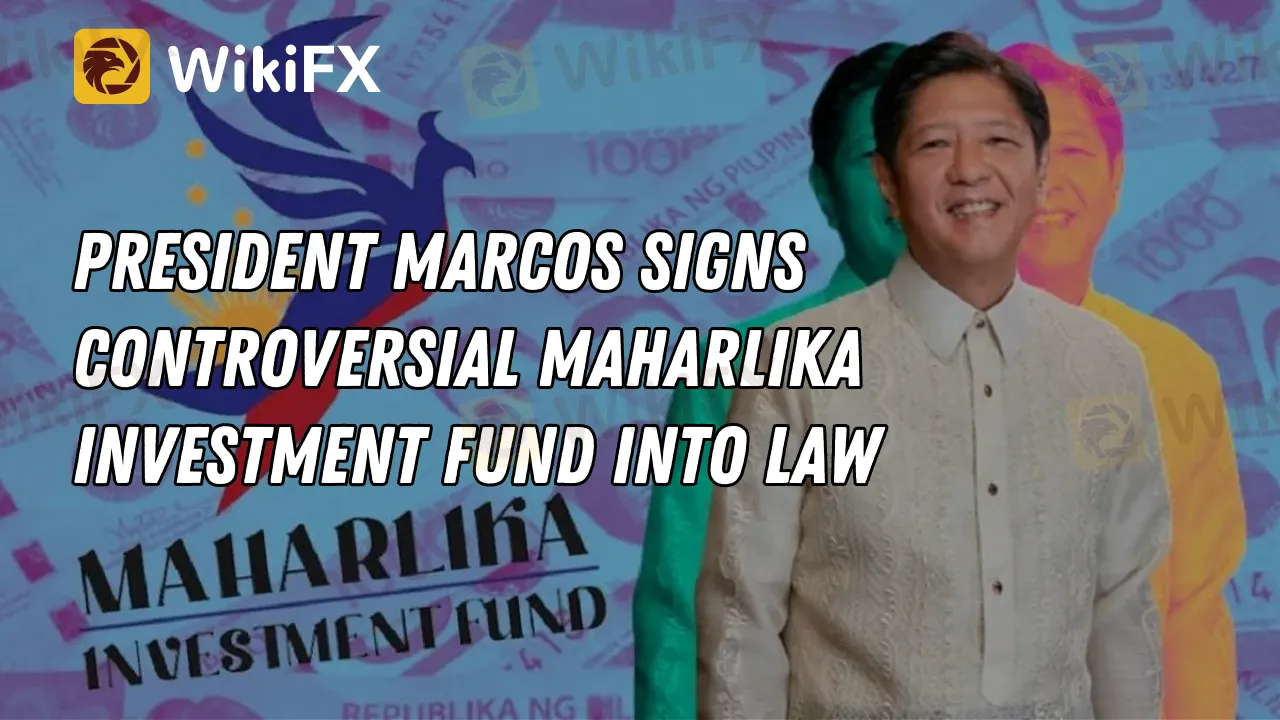简体中文
繁體中文
English
Pусский
日本語
ภาษาไทย
Tiếng Việt
Bahasa Indonesia
Español
हिन्दी
Filippiiniläinen
Français
Deutsch
Português
Türkçe
한국어
العربية
President Marcos Signs Controversial Maharlika Investment Fund into Law
Abstract:President Marcos signs the Maharlika Investment Fund (MIF) into law despite controversy, aimed at job creation, economic growth, and poverty reduction in the Philippines.

MANILA, Philippines - The country's president, Ferdinand “Bongbong” Marcos Jr., has officially given the nod to the much-debated Maharlika Investment Fund (MIF) bill. The signing of the bill, held in the historical Kalayaan Hall of the Malacañang Palace, has now transformed the MIF into a law. It took place amidst a mixture of support and criticism from the legislative members of both the Senate and the House of Representatives.
The Maharlika Investment Fund (MIF), a venture cloaked in controversy, has seen opposition from lawmakers due to potential investment risks. Aquilino Pimentel III, the Senate Minority Leader, had vociferously urged Marcos to veto the legislation. Pimentel's main concern revolved around the law diverting crucial resources away from immediate, pressing issues such as the education and healthcare sectors.
Echoing these sentiments, Senator Francis Escudero labeled the MIF as “a leap into the unknown”. This conveys the inherent uncertainty and potential drawbacks of the fund, which have elicited apprehension among some lawmakers.

Despite these voices of dissent, President Marcos deemed the bill as critical, expediting its passage through both chambers of Congress. This came as no surprise since the MIF received strong backing in both chambers. The Maharlika Investment Fund bill successfully secured 279 votes in the House of Representatives and an additional 19 votes in the Senate.
However, not all lawmakers sided with the majority. A total of seven lawmakers, including Sen. Risa Hontiveros and Representatives France Castro, Raoul Manuel, Arlene Brosas, Edcel Lagman, Mujiv Hataman, and Gabriel Bordado, voted against the MIF, raising their concerns over the potential risks and uncertainties associated with the fund.
Despite the criticism, proponents of the Maharlika Investment Fund maintain that it will bring a host of benefits to Filipinos. Senator Mark Villar, in his statement, outlined the various advantages that the MIF is expected to yield.

“Actually, there are a lot of benefits that we can get from the MIF. First, it would create more jobs, more infrastructure projects mean more job opportunities for Filipinos. Secondly, we will promote economic growth since better infrastructure leads to more efficient transportation, communication, and other systems. Also, this will be a vehicle to reduce poverty, this would help the government manage its budget and mitigate fiscal pressures during economic downturns as it acts as a safety net for the country,” Villar stated.
In essence, proponents see the Maharlika Investment Fund as a pathway to enhanced job creation, infrastructural development, and economic growth, alongside providing a financial buffer during economic slumps. Critics, however, remain wary of its potential pitfalls and diverting resources from other critical sectors.
It's clear that the Maharlika Investment Fund represents a bold move on the part of the government, one that has stirred both support and controversy. As the dust settles, the focus will be on how the MIF delivers on its promises and manages its potential pitfalls.
Stay updated on the latest developments about the Maharlika Investment Fund by downloading and installing the WikiFX App on your smartphone. Download the App here: https://www.wikifx.com/en/download.html.

Disclaimer:
The views in this article only represent the author's personal views, and do not constitute investment advice on this platform. This platform does not guarantee the accuracy, completeness and timeliness of the information in the article, and will not be liable for any loss caused by the use of or reliance on the information in the article.
Read more

ATFX Enhances Trading Platform with BlackArrow Integration
ATFX integrates the BlackArrow trading platform, offering advanced tools for forex, crypto, and stocks with automation and real-time analytics for traders.

Exposing the Truth: What Happened with the Losses of Thousands of Dollars on the GlobTFX Platform?
The facts are clear and undeniably shocking—GlobTFX has caused significant financial losses to well-known traders in the Arab world. Eighteen victims have confirmed a total loss exceeding $22,372! But this is just the tip of the iceberg…

UK Hits HSBC, 3 Banks with £104.4M Fine for Bond Misconduct
HSBC, Citi, RBC, and Morgan Stanley fined £104.4M by CMA for sharing sensitive bond market info, distorting UK gilts competition from 2009-2013.

XTB Secures Chilean License, Expands Latin America Footprint
XTB gains a securities agent license in Chile, boosting its Latin America presence. The broker plans to offer stocks, ETFs, and derivatives to local investors.
WikiFX Broker
Latest News
Brazilian Man Charged in $290 Million Crypto Ponzi Scheme Affecting 126,000 Investors
Become a Full-Time FX Trader in 6 Simple Steps
ATFX Enhances Trading Platform with BlackArrow Integration
IG 2025 Most Comprehensive Review
Construction Datuk Director Loses RM26.6 Mil to UVKXE Crypto Scam
SEC Drops Coinbase Lawsuit, Signals Crypto Policy Shift
Should You Choose Rock-West or Avoid it?
Scam Couple behind NECCORPO Arrested by Thai Authorities
Franklin Templeton Submitted S-1 Filing for Spot Solana ETF to the SEC on February 21
Top Profitable Forex Trading Strategies for New Traders
Currency Calculator






